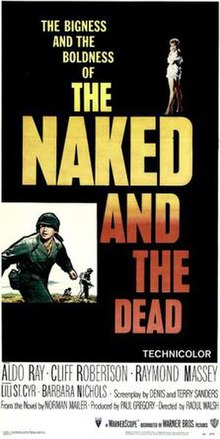The Naked and the Dead (film)
| The Naked and the Dead | |
|---|---|

Theatrical release poster | |
| Directed by | Raoul Walsh |
| Produced by | Paul Gregory |
| Written by | Denis Sanders Terry Sanders |
| Based on | The Naked and the Dead 1948 novel by Norman Mailer |
| Starring | Aldo Ray Cliff Robertson Raymond Massey Lili St. Cyr |
| Music by | Bernard Herrmann |
| Cinematography | Joseph LaShelle |
| Edited by | Arthur P. Schmidt |
|
Production company |
|
| Distributed by | Warner Bros. |
|
Release dates |
|
|
Running time |
131 minutes |
| Country | United States |
| Language | English |
The Naked and the Dead is a 1958 Technicolor widescreen film based on Norman Mailer's World War II novel The Naked and the Dead.[2] Directed by Raoul Walsh and filmed in Panama, the screenplay attributed to the Sanders brothers adds a strip tease and action scenes to Mailer's original narrative. Made by RKO just before its demise, the film was released by Warner Brothers and was the last one Raoul Walsh directed for that studio.
Plot[edit]
Filled with flashbacks, it the story of Lt Hearn (Cliff Robertson), an aide to General Cummings (Raymond Massey), who treats Hearn as a son and a friend. The General believes that commanding officers ought to inspire fear in their subordinates, in order to enforce discipline. Hearn expresses distaste for these views, preferring instead that soldiers should have mutual respect for each other, regardless of rank. Hearn is eventually transferred to lead an intelligence and reconnaissance platoon on a dangerous reconnaissance mission.
The platoon had originally been led by Sgt Croft (Aldo Ray), who now must serve under Hearn. Croft is a professional soldier with a reputation for cruelty. Hearn's relatively idealistic approach is contrasted with Croft's desire to win at all costs. When Hearn considers abandoning the mission due to excessive Japanese presence, Croft tricks him into underestimating the enemy. This eventually leads to several deaths in the platoon, and Hearn himself is wounded.
Some of the men head back, carrying Hearn on a stretcher. Croft presses onward with the remaining men. Croft is killed in action, but his men accomplish their mission, relaying vital intelligence to headquarters. Hearn's men consider leaving him to die, as they can escape faster on their own, but decide to continue carrying him despite the risk. The survivors, including Hearn, make it back to headquarters. once there, Hearn tells the General that the men who carried him on a stretcher did so out of love, not fear.
Cast[edit]
- Aldo Ray as Sgt. Sam Croft
- Cliff Robertson as Lt. Robert Hearn
- Raymond Massey as Gen. Cummings
- Lili St. Cyr as Willa Mae aka Lily
- Barbara Nichols as Mildred Croft
- William Campbell as Brown
- Richard Jaeckel as Gallagher
- James Best as Rhidges
- Joey Bishop as Roth
- Jerry Paris as Goldstein
- Robert Gist as Red
- L. Q. Jones as Woodrow 'Woody' Wilson
- Max Showalter as Col. Dalleson (as Casey Adams)
- John Beradino as Capt. Mantelli (as John Berardino)
- Edward McNally as Cohn
- Greg Roman as Minetta
Production[edit]
The film was eventually picked up by Paul Gregory and Charles Laughton, and was to be made after The Night of the Hunter. Terry and Dennis Sanders who had worked on the screenplay and Stanley Cortez who had photographed The Night of the Hunter were to write and photograph the film[3] with Laughton directing. Press releases of the time said that Robert Mitchum was to star and Walter Schumann would compose the score.[4] The box office failure of The Night of the Hunter led to the film being taken over by Raoul Walsh who brought in an uncredited writer to redo the Sanders screenplay[5][6] whilst Cortez was replaced by Joseph LaShelle.
The film was made on location in Panama with 250 American soldiers as extras. Hawaiian-born soldiers of Japanese descent depicted Japanese soldiers[4] and local actors from the Canal Zone Theatre Guild appeared in the film.[7]
Reception[edit]
A.H. Weiler of The New York Times said in the review of the movie, "Credit (director Raoul Walsh), producer Paul Gregory and especially the writing team of Denis and Terry Sanders with laundering the billingsgate of the original and in extracting the derring-do of the author's impassioned work. But in so doing they have simply come up with a surface recounting of a platoon doomed to decimation in securing a small island in the Pacific in 1943. They have quickly limned a general who is a black-and-white militarist, nothing more, and of officers who only appear as quickly passing figures in a kaleidoscope of briefings and small talk."[8]
'TV영화관' 카테고리의 다른 글
| Willy Wonka & the Chocolate Factory (0) | 2016.12.31 |
|---|---|
| Raymond Massey (0) | 2016.12.30 |
| 야인시대 (0) | 2016.12.24 |
| 김두한 (0) | 2016.12.24 |
| A Christmas Carol (1999 film) (0) | 2016.12.20 |